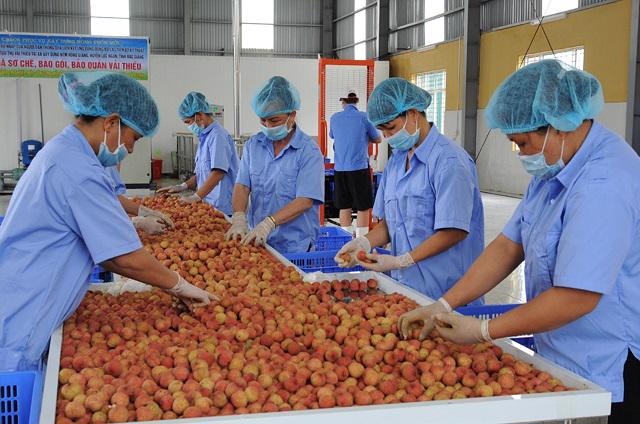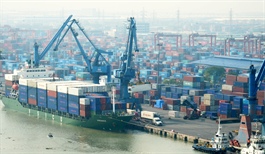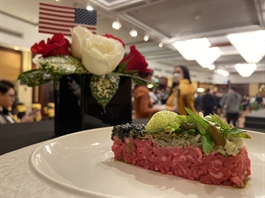Vietnam has great opportunities in agricultural exports despite global turbulence
Vietnam has great opportunities in agricultural exports despite global turbulence
Higher competitiveness and product quality are essential for Vietnam products to penetrate markets with high standards for imports.
Experts said there remain huge opportunities for Vietnam’s agricultural exports despite the impacts of the Russia-Ukraine conflict on global trade, especially with the diversified network of trade agreements that the country is a part of.

Processing lychees for exports at Hong Giang Trade and Production Cooperative in Bac Giang Province. Photo: Tuan Anh |
Vice General Secretary of the Handicraft and Wood Industry Association of Ho Chi Minh City (HAWA) Bui Huu Them expected strong prospects for Vietnam’s exports of wooden products to the US and EU, currently accounting for 80% of the total turnover in this field.
“Local firms should be ready to grasp opportunities in case there is a surge in demand from these markets,” Them said.
Meanwhile, Vice Chairman of the Vietnam Food Association Do Ha Nam said the fact that western countries are boycotting Russian products means Vietnam could further import fertilizers, wheat, or oil with more competitive prices, but urged the country to take into consideration the impacts of sanctions imposed on Russia.
According to Nam, this is the right time for Vietnam to boost the export of rice and other farm produce to the EU, thanks to the 0% import tariff under the EU-Vietnam Free Trade Agreement (EVFTA).
“A focus should be placed on high quality and fragrant rice products that are fast becoming favored by European customers,” he said.
Echoing Nam’s view, General Director of Vietnam Fruit and Vegetables Association (Vinafruit) Dang Phuc Nguyen forecast Vietnam could double its rice export turnover to Europe and US by taking advantage of the growing demand for Vietnamese farm produce.
Nguyen, however, urged local firms to further improve product quality to meet high standards such as the GlobalGAP in these markets.
“It is significant especially as few Vietnamese vegetables meet this standard,” he added.
On the prospects of Vietnam’s farm produce exports, former Vice Director of the General Statistics Office Vu Thanh Liem said sanctions imposed on Russia are causing disruption to ongoing supply chains, and therefore, offer chances for others to take their place.
“Vietnam and other Asian countries could seize this opportunity to not only boost its trade relations with Russia but also with other countries, especially those that are facing impacts from the Russia-Ukraine conflict,” Liem noted.
General Director of the General Department for Agricultural Products Processing and Market Development under the Ministry of Agriculture and Rural Development Nguyen Quoc Toan said the agency has instructed localities to step up seafood production in anticipation of growing demand from the EU, US, and Russia.
“Local firms should continue taking advantage of major trade deals such as the EVFTA or UKVFTA to strive for earning greater market shares in these regions,” he said.
In this regard, Deputy Director of the Ministry of Industry and Trade’s Import and Export Department Tran Thanh Hai noted higher competitiveness and product quality are essential for Vietnam products to penetrate demanding markets.
“Key priorities for Vietnamese companies are to strengthen supply chains and apply IT in operation for sustainability and efficiency,” he concluded.
























